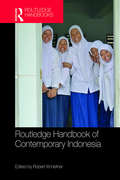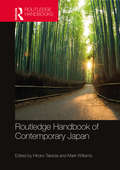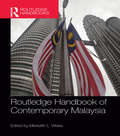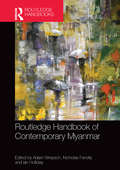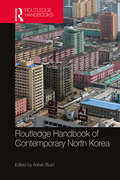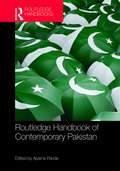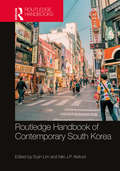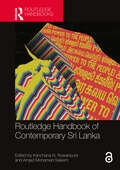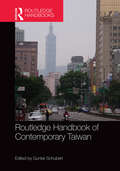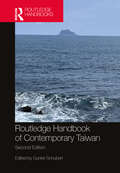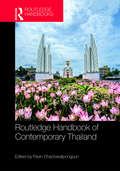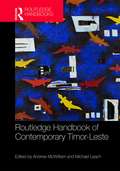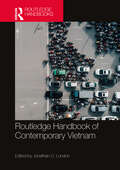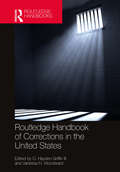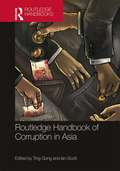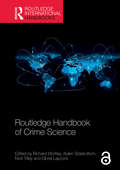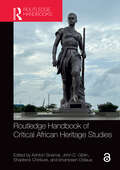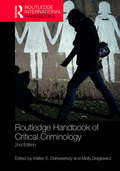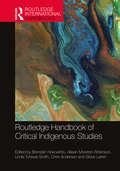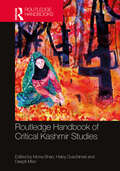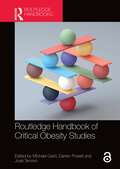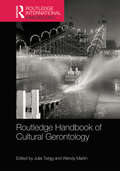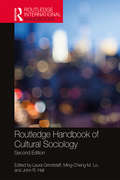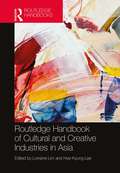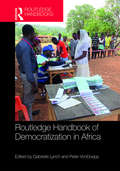- Table View
- List View
Routledge Handbook of Contemporary Indonesia
by Robert W. HefnerFew countries as culturally rich, politically pivotal, and naturally beautiful as Indonesia are as often misrepresented in global media and conversation. Stretching 3,400 miles east to west along the equator, Indonesia is the fourth most populous country in the world and home to more than four hundred ethnic groups and several major world religions. This sprawling Southeast Asian nation is also the world’s most populous Muslim-majority country and the third largest democracy. Although in recent years the country has experienced serious challenges with regard to religious harmony, its trillion-dollar economy is booming and its press and public sphere are among the most vibrant in Asia. A land of cultural contrasts, contests, and contradictions, this ever-evolving country is today rising to even greater global prominence, even as it redefines the terms of its national, religious, and civic identity. The Routledge Handbook of Contemporary Indonesia offers an overview of the modern making and contemporary dynamics of culture, society, and politics in this powerful Asian nation. It provides a comprehensive survey of key issues in Indonesian politics, economics, religion, and society. It is divided into six sections, organized as follows: Cultural Legacies and Political Junctures Contemporary Politics and Plurality Markets and Economic Cultures Muslims and Religious Plurality Gender and Sexuality Indonesia in an Age of Multiple Globalizations Bringing together original contributions by leading scholars of Indonesia in law, political science, history, anthropology, sociology, religious studies, and gender studies this Handbook provides an up-to-date, interdisciplinary, and academically rigorous exploration of Indonesia. It will be of interest to students, academics, policymakers, and others in search of reliable information on Indonesian politics, economics, religion, and society in an accessible format.
Routledge Handbook of Contemporary Japan
by Hiroko Takeda; Mark WilliamsThe Routledge Handbook of Contemporary Japan presents a synthesized, interdisciplinary study of contemporary Japan based on up-to-date theoretical models designed to provide readers with a comprehensive and full understanding of the dynamics of contemporary Japan. In order to achieve this, the Handbook is organized into two parts. Part I, ‘Foundations’, clarifies the state of contemporary Japan topic by topic by referring to the latest theoretical developments in the relevant disciplinary fields of politics, international relations, economy, society, culture and the personal. Part II, ‘Issues’, then offers a series of concrete analyses building upon the theoretical discussions introduced in Part I to help undergraduate and postgraduate students learn how to conduct independent analysis. Locating Japan in a comparative and interdisciplinary perspective, this Handbook is an essential resource for students and scholars interested in Japanese studies, Asian studies and global studies.
Routledge Handbook of Contemporary Malaysia
by Meredith L. WeissThe Routledge Handbook of Contemporary Malaysia offers a broad, analytical survey of Malaysia. It provides a comprehensive survey of significant topics in Malaysian politics, economy, and society today, focussing on issues, institutions, and trends. It is divided into four thematic sections, which are all introduced by the editor: • Domestic politics • Economics • Social policy and social development • International relations and security. The volume brings together an international team of experts: an interdisciplinary mix of forty contributors from Malaysia and elsewhere, including many of the leading specialists on Malaysian affairs. The chapters included in the volume form an accessible and fascinating window onto contemporary Malaysia. They each introduce a different aspect of the Malaysian polity, economy, or society, offering both historical perspective and a current assessment or investigation. Designed for general readers and specialists alike, chapters may be read individually -- each stands on its own -- or conjointly. Up-to-date, interdisciplinary, and academically rigorous, the Handbook will be of interest to students, academics, policymakers, and others in search of reliable information on Malaysian politics, economics, and society.
Routledge Handbook of Contemporary Myanmar
by Adam Simpson , Nicholas Farrelly and Ian HollidayAfter decades of mismanagement and direct military rule, Myanmar’s contested transition to a more democratic government has rapidly shifted the outlook in this significant Southeast Asian nation. Since 2011, the removal of Western sanctions and new foreign investments have resulted in high rates of economic growth and an expanding middle class, albeit from a very low base. In a result unthinkable a few years earlier, former political prisoner and Nobel laureate Aung San Suu Kyi and her party, the National League for Democracy (NLD), formed a national government in early 2016. However, despite significant political and economic reforms since the liberalisation process commenced, the transition to civilian rule remains constrained by the military’s 2008 Constitution, which guarantees that it operates unfettered by civilian oversight. As a result, although some ethnic conflicts have abated, others continue to fester and new conflicts have erupted. With a daunting task ahead the NLD government has made some progress in removing the vestiges of repressive military-era laws but many remain untouched and some of the practices of the new government provide unwelcome reminders of its authoritarian history. This timely Handbook describes the political, economic, and cultural dimensions of this crucial period of transition in Myanmar. It presents explanations for contradictory trends, including those that defy some of the early narratives about the comprehensive transformation of Myanmar. The Handbook also considers the impact of major environmental, strategic, and demographic trends which help underscore that Myanmar’s development will be an ongoing task. In addition to introductory and concluding chapters by the editors, the body of the Handbook is divided into seven core sections: • Fundamentals • Spaces • Cultures • Living • Governance • International • Challenges Written by an international team of scholars, with a mix of world-leading established academics and talented emerging researchers, the Handbook provides a rigorous scholarly overview of Myanmar’s politics, economics, and society. As Myanmar opens to Western businesses and government agencies, this is an invaluable reference book that will provide a foundation for further research and offer the first port of call for scholars, students, and policy makers working on Myanmar and Asia.
Routledge Handbook of Contemporary North Korea
by Adrian BuzoThe Routledge Handbook of Contemporary North Korea presents a comprehensive picture of contemporary North Korea, placed in historical context and set against the overlapping fields of politics, economy, culture, society and foreign relations. Spanning a period of significant transition for North Korea, this volume provides accurate analysis and applications of both historical and institutional perspectives. The volume’s chapters are representative of the growth in North Korean studies that has occurred since the 1990s, in parallel with the growing maturity of the field in South Korea, as well as with far greater levels of access to North Korean sources. The volume is divided into five Parts, each reflecting an emergent area of debate and research: The political perspective The North Korean economy Foreign relations Society Culture This is the first anthology of North Korean studies to demonstrate a clear understanding of North Korea as North Korea, as opposed to a dimly perceived and threatening rogue state. It features both Korean and non-Korean contributors, many working from primary source material. As such, this handbook will prove a valuable resource to students and scholars of Northeast Asian studies, modern Korean history and politics, and comparative politics more broadly.
Routledge Handbook of Contemporary Pakistan
by Aparna PandeWith a population of 190 million, Pakistan is strategically located at the crossroads of the Middle East, Central and South Asia, and has the second largest Muslim population in the world. The Routledge Handbook of Contemporary Pakistan provides an in-depth and comprehensive coverage of issues from identity and the creation of Pakistan in 1947 to its external relations as well as its domestic social, economic and political issues and challenges. The Handbook is divided into the following sections: • Economy and development • External relations and security • Foundations and identity • Islam and Islamization • Military and jihad • Politics and institutions • Social issues The Handbook explains the reasons why Pakistan is so often at the forefront of our daily news intake, with a focus on religious and political factors. It asks questions regarding the institutions and political parties which govern Pakistan and provides an insight into the relationships which the country has forged since its creation, culminating in a discussion of the state’s involvement in conflict. Covering a range of topics, this Handbook offers a wide range of perspectives on Pakistan. Bringing together a group of leading international scholars on Pakistan, the Handbook is a cutting-edge and interdisciplinary resource for those interested in studying Pakistani politics, economics, culture and society and South Asian Studies.
Routledge Handbook of Contemporary South Korea
by Sojin LimThe Routledge Handbook of Contemporary South Korea offers a ground-breaking study of the socio-political development of the Korean peninsula in the contemporary period. Written by an international team of scholars and experts, contributions to this book address key intellectual questions in the development of Korean studies, projecting new ways of thinking about how international systems can be organised and how local societies adapt to global challenges. Academically rigorous, each chapter defines current research and lends the reader greater understanding of the social, cultural, economic, and political developments of South Korea, ranging from chapters on the Korean Wave to relations with North Korea and the Korean language overseas. The volume is divided into eight sections, each representing a focused area of inquiry: socio-political history contemporary politics political economy and development society culture international relations security and diplomacy South Korea in international education This handbook provides an interdisciplinary and comprehensive account of contemporary South Korea. It will be of great interest to students and scholars of Korean history, politics and international relations, culture and society, and will also appeal to policy makers interested in the Indo-Asia Pacific region.
Routledge Handbook of Contemporary Sri Lanka
by Kanchana N. Ruwanpura Amjad Mohamed SaleemThe Routledge Handbook of Contemporary Sri Lanka offers a comprehensive survey of issues facing the island country and an overview delineating some key moments in the country’s contemporary polity, economy, and sociality.This book outlines aspects and influences foundational to understanding a country defined by its economic and political turmoil, and rift with public distrust in today’s shifting geopolitics. Chapters by various established scholars highlight this book’s pivotal contribution in situating Sri Lanka’s turmoil and deprivation in this current conjuncture.The handbook is structured in seven parts: Nations and Nationalism Politics, State and Institutions Economy and Political Economy Work and Life Environment and Environmental Politics Society, Social Systems, and Culture Moment of Flux, Looking Ahead Each part includes on average six chapters covering the social sciences and humanities to survey emerging and cutting-edge areas of the study of Sri Lanka. Multi-disciplinary in focus, the book also includes an introductory section and concluding section, which creates the space and platform for senior, mid-ranking, and junior academics to engage in dynamic conversation with each other about contemporary Sri Lanka. Including scholarship from Sri Lankan experts, the handbook creates academic output, which chimes with broader calls in academia on decolonising the academic landscape.An important reference work, this handbook will be of interest to scholars and students from wideranging academic disciplines and a focus on Sri Lanka, Asian and South Asian studies, sociology, environmental politics, development, labour, management, political economy and anthropology.The Open Access version of this book, available at http://www.taylorfrancis.com, has been made available under a Creative Commons Attribution-Non Commercial-No Derivatives (CC-BY-NC-ND) 4.0 license.
Routledge Handbook of Contemporary Taiwan
by Gunter SchubertThe Routledge Handbook of Contemporary Taiwan offers a comprehensive overview of both contemporary Taiwan and the Taiwan studies field. Each contribution summarises the major findings in the field and highlights long-term trends, recent observations and possible future developments in Taiwan. Written by an international team of experts, the chapters included in the volume form an accessible and fascinating insight into contemporary Taiwan. Up-to-date, interdisciplinary, and academically rigorous, the Handbook will be of interest to students, academics, policymakers and others in search of reliable information on Taiwanese politics, economics, culture and society.
Routledge Handbook of Contemporary Taiwan
by Gunter SchubertThis fully revised 2nd edition of the Routledge Handbook of Contemporary Taiwan provides a comprehensive overview of both contemporary Taiwan and the Taiwan studies field.Written by an international team of Taiwan experts, the Handbook includes major topics in Taiwanese history, domestic politics, political economy, society, culture, and international relations. Each chapter summarises the major findings in the field and highlights long-term trends, recent observations, and potential future developments in Taiwan, revealing its long journey from a frontier island to a highly industrialised country struggling for international recognition.Up-to-date, interdisciplinary, and academically rigorous, the Handbook offers the reader an accessible and fascinating insight into contemporary Taiwan and will be of interest to students, academics, and policymakers with an interest in all things Taiwan.
Routledge Handbook of Contemporary Thailand
by Pavin ChachavalpongpunThe Routledge Handbook of Contemporary Thailand is a timely survey and assessment of the state of contemporary Thailand. While Thailand has changed much in the past decades, this handbook proposes that many of its problems have remained intact or even persistent, particularly problems related to domestic politics. It underlines emerging issues at this critical juncture in the kingdom and focuses on the history, politics, economy, society, culture, religion and international relations of the country. A multidisciplinary approach, with chapters written by experts on Thailand, this handbook is divided into the following sections. History Political and economic landscape Social development International relations Designed for academics, students, libraries, policymakers and general readers in the field of Asian studies, political science, economics and sociology, this invaluable reference work provides an up-to-date account of Thailand and initiates new discussion for future research activities.
Routledge Handbook of Contemporary Timor-Leste
by Michael Leach Andrew McWilliamReflecting on the legacies of Timor-Leste's remarkable journey from colonialism to sovereign and democratic Independence, the Routledge Handbook of Contemporary Timor-Leste provides a comprehensive and up-to-date reference work on all aspects of life in Timor-Leste. Following an introduction and overview of the country, the Handbook is divided into five parts: Politics and governance Economics and development Social policies and the terms of inclusion Cultural impacts Regional relations Written by an international team of experts, the Handbook covers the principle concerns that have contributed significantly to the shape and character of contemporary Timor-Leste. It offers a timely and valuable reference guide for students, scholars and policymakers with an interest in International Relations, Southeast Asian Studies and Peace Studies.
Routledge Handbook of Contemporary Vietnam
by Jonathan D. LondonThe Routledge Handbook of Contemporary Vietnam is a comprehensive resource exploring social, political, economic, and cultural aspects of Vietnam, one of contemporary Asia’s most dynamic but least understood countries. Following an introduction that highlights major changes that have unfolded in Vietnam over the past three decades, the volume is organized into four thematic parts: •Politics and Society•Economy and Society•Social Life and Institutions•Cultures in Motion Part I addresses key aspects of Vietnam’s politics, from the role of the Communist Party of Vietnam in shaping the country’s institutional evolution, to continuity and change in patterns of socio-political organization, political expression, state repression, diplomatic relations, and human rights. Part II assesses the transformation of Vietnam’s economy, addressing patterns of economic growth, investment and trade, the role of the state in the economy, and other economic aspects of social life. Parts III and IV examine developments across a variety of social and cultural fields through chapters on themes including welfare, inequality, social policy, urbanization, the environment and society, gender, ethnicity, the family, cuisine, art, mass media, and the politics of remembrance. Featuring 38 essays by leading Vietnam scholars from around the world, this book provides a cutting-edge analysis of Vietnam’s transformation and changing engagement with the world. It is an invaluable interdisciplinary reference work that will be of interest to students and academics of Southeast Asian studies, as well as policymakers, analysts, and anyone wishing to learn more about contemporary Vietnam.
Routledge Handbook of Corrections in the United States (Routledge International Handbooks)
by O. Hayden Griffin III and Vanessa H. WoodwardThe Routledge Handbook of Corrections in the United States brings together original contributions from leading scholars in criminology and criminal justice that provide an in-depth, state-of-the-art look at the most important topics in corrections. The book discusses the foundations of corrections in the United States, philosophical issues that have guided historical movements in corrections, different types of punishment and supervision, trends in incarceration, issues affecting race, ethnicity, and special populations in corrections, and a variety of other emerging issues. This book scrutinizes innovative community programs as well as more traditional sanctions, and exposes the key issues and debates surrounding the correctional process in the United States. Among other important topics, selections address the inherent discrimination within the system, special issues surrounding certain populations, and the utilization of the death penalty as the ultimate punishment. This book serves as an essential reference for academicians and practitioners working in corrections and related agencies, as well as for students taking courses in criminal justice, criminology, and related subjects.
Routledge Handbook of Corruption in Asia
by Ian Scott Ting GongCorruption in Asia ranges from the venal rent-seeking of local officials to the million-dollar bribes received by corrupt politicians; from excessive position-related consumption to future job offers in the private sector for compliant public servants; from money-laundering to ‘white elephant’ projects that do little more than line the pockets of developers and their political partners. The Routledge Handbook of Corruption in Asia addresses the theories, issues and trends in corruption and anticorruption reform that have emerged from this diverse experience. The book is divided into four major parts: corruption and the state; corruption and economic development; corruption and society; and controlling corruption: strategies, successes and failures. Chapters compare and contrast corruption in different social and institutional contexts, examine both successful and unsuccessful attempts to control it, and consider what lessons can be drawn from these Asian experiences. This academically rigorous and insightful book will be of interest to a wide range of students and scholars, particularly those of Asian studies, politics and sociology.
Routledge Handbook of Crime Science (Routledge International Handbooks)
by Richard Wortley Nick Tilley Aiden Sidebottom Gloria LaycockCrime science is precisely what it says it is: the application of science to the phenomenon of crime. This handbook, intended as a crime science manifesto, showcases the scope of the crime science field and provides the reader with an understanding of the assumptions, aspirations and methods of crime science, as well as the variety of topics that fall within its purview. Crime science provides a distinctive approach to understanding and dealing with crime: one that is outcome-oriented, evidence-based and that crosses boundaries between disciplines. The central mission of crime science is to find new ways to cut crime and increase security. Beginning by setting out the case for crime science, the editors examine the roots of crime science in environmental criminology and describe its key features. The book is then divided into two sections. The first section comprises chapters by disciplinary specialists about the contributions their sciences can make or have already made to crime science. The second section of the book comprises a series of exemplary case studies in crime science, showing a wide range of the kind of work that crime scientists do. The editors conclude by drawing on the preceding contributions, as well as germane areas of research, to offer a thoughtful consideration of future directions for crime science. This book is essential reading for social scientists and scientists alike and marks a new phase in the study of crime and its detection and prevention.
Routledge Handbook of Critical African Heritage Studies
by Shadreck Chirikure Ashton Sinamai John D. Giblin Ishanlosen OdiauaThis handbook is a foundational reference point for critical heritage research about Africa and its diaspora.Foregrounding the diversity of knowledge systems needed to examine heritage issues in such a diverse continent, the contributors to this volume: argue for an understanding heritage that is at once both natural and cultural, tangible and intangible, political and dissonant, going beyond the physical and objective to include subjective narratives, performances, rituals, memories and emotions examine the pre-coloniality, coloniality, post-coloniality, and decoloniality of current African heritage discourses and their consequences analyse how heritage legislation derived from colonial law is compatible or otherwise with how heritage is perceived, identified and remembered in African communities discuss questions of repatriation, restitution and reparations in relation to the return of artefacts from Western countries illuminate the importance of ‘difficult heritage’ within Africa and its diaspora consider the role of heritage for development in Africa Making a crucial contribution to our understanding of African conceptions and practices of heritage, this book is an important read for scholars of African Studies, heritage and museum studies, archaeology, anthropology and history.
Routledge Handbook of Critical Criminology: 2nd edition (Routledge International Handbooks)
by Walter S. Dekeseredy Molly DragiewiczThe main objective of the second edition of the Routledge Handbook of Critical Criminology is twofold: (1) to provide original chapters that cover contemporary critical criminological theoretical offerings generated over the past five years and (2) to provide chapters on important new substantive topics that are currently being studied and theorized by progressive criminologists. Special attention is devoted to new theoretical directions in the field, such as southern criminology, queer criminology, and green criminology. The diverse chapters cover not only cutting-edge theories, but also the variety of research methods used by leading scholars in the field and the rich data generated by their rigorous empirical work. In addition, some of the chapters suggest innovative and realistic short- and long-term policy proposals that are typically ignored by mainstream criminology. These progressive strategies address some of the most pressing social problems facing contemporary society today, which generate much pain and suffering for socially and economically disenfranchised people. The new edition of the Handbook is a major work in redefining areas within the context of international multidisciplinary critical research, and in highlighting emerging areas, such as human trafficking, Internet pornography and image-based sexual abuse. It is specifically designed to be a comprehensive resource for undergraduate and postgraduate students, researchers and policymakers.
Routledge Handbook of Critical Indigenous Studies (Routledge International Handbooks)
by Brendan Hokowhitu, Aileen Moreton-Robinson, Linda Tuhiwai-Smith, Chris Andersen and Steve LarkinThe Routledge Handbook of Critical Indigenous Studies is the first comprehensive overview of the rapidly expanding field of Indigenous scholarship. The book is ambitious in scope, ranging across disciplines and national boundaries, with particular reference to the lived conditions of Indigenous peoples in the first world. The contributors are all themselves Indigenous scholars who provide critical understandings of indigeneity in relation to ontology (ways of being), epistemology (ways of knowing), and axiology (ways of doing) with a view to providing insights into how Indigenous peoples and communities engage and examine the worlds in which they are immersed. Sections include: • Indigenous Sovereignty • Indigeneity in the 21st Century • Indigenous Epistemologies • The Field of Indigenous Studies • Global Indigeneity This handbook contributes to the re-centring of Indigenous knowledges, providing material and ideational analyses of social, political, and cultural institutions and critiquing and considering how Indigenous peoples situate themselves within, outside, and in relation to dominant discourses, dominant postcolonial cultures and prevailing Western thought. This book will be of interest to scholars with an interest in Indigenous peoples across Literature, History, Sociology, Critical Geographies, Philosophy, Cultural Studies, Postcolonial Studies, Native Studies, Māori Studies, Hawaiian Studies, Native American Studies, Indigenous Studies, Race Studies, Queer Studies, Politics, Law, and Feminism.
Routledge Handbook of Critical Kashmir Studies
by Deepti Misri Mona Bhan Haley DuschinskiThe Routledge Handbook of Critical Kashmir Studies presents emerging critical knowledge frameworks and perspectives that foreground situated histories and resistance practices to challenge colonial and postcolonial forms of governance and state building. It politicizes discourses of nationalism, patriotism, democracy, and liberalism, and it questions how these dominant globalist imaginaries and discourses serve institutionalized power, create hegemony, and normalize domination. In doing so, the handbook situates Critical Kashmir Studies scholarship within global scholarly conversations on nationalism, sovereignty, indigenous movements, human rights, and international law. The handbook is organized into the following five parts: • Territories, Homelands, Borders • Militarism, Humanism, Occupation • Memories, Futures, Imaginations • Religion, History, Politics • Armed Conflict, Global War, Transnational Solidarities A comprehensive reference work documenting and consolidating the growing Critical Kashmir Studies scholarship, this handbook will be of interest to scholars of anthropology, political science, cultural studies, legal and sociolegal studies, sociology, history, critical Indigenous studies, settler colonial studies, and feminist studies.
Routledge Handbook of Critical Obesity Studies
by Michael GardThe Routledge Handbook of Critical Obesity Studies is an authoritative and challenging guide to the breadth and depth of critical thinking and theory on obesity. Rather than focusing on obesity as a public health crisis to be solved, this reference work offers divergent and radical strategies alongside biomedical and positivist discourses. Comprised of thirty nine original chapters from internationally recognised academics, as well as emerging scholars, the Handbook engages students, academics, researchers and practitioners in contemporary critical scholarship on obesity; encourages engagement of social science and related disciplines in critical thinking and theorising on obesity; enhances critical theoretical and methodological work in the area, highlighting potential gaps as well as strengths; relates critical scholarship to new and evolving areas of obesity-related practices, policies and research. This multidisciplinary and international collection is designed for a broad audience of academics, researchers, students and practitioners within the social and health sciences, including sociology, obesity science, public health, medicine, sports studies, fat studies, psychology, nutrition science, education and disability studies.
Routledge Handbook of Cultural Gerontology (Routledge International Handbooks)
by Wendy Martin Julia TwiggLater years are changing under the impact of demographic, social and cultural shifts. No longer confined to the sphere of social welfare, they are now studied within a wider cultural framework that encompasses new experiences and new modes of being. Drawing on influences from the arts and humanities, and deploying diverse methodologies – visual, literary, spatial – and theoretical perspectives Cultural Gerontology has brought new aspects of later life into view. This major new publication draws together these currents including: Theory and Methods; Embodiment; Identities and Social Relationships; Consumption and Leisure; and Time and Space. Based on specially commissioned chapters by leading international authors, the Routledge Handbook of Cultural Gerontology will provide concise authoritative reviews of the key debates and themes shaping this exciting new field.
Routledge Handbook of Cultural Sociology: 2nd Edition (Routledge International Handbooks)
by John R. Hall Laura Grindstaff Ming-Cheng M. LoThe thoroughly revised and updated second edition of the Routledge Handbook of Cultural Sociology provides an unparalleled overview of sociological and related scholarship on the complex relations of culture to social structures and everyday life. With 70 essays written by scholars from around the world, the book brings diverse approaches into dialogue, charting new pathways for understanding culture in our global era. Short, accessible chapters by contributing authors address classic questions, emergent issues, and new scholarship on topics ranging from cultural and social theory to politics and the state, social stratification, identity, community, aesthetics, and social and cultural movements. In addition, contributors explore developments central to the constitution and reproduction of culture, such as power, technology, and the organization of work. This handbook is essential reading for undergraduate and postgraduate students interested in a wide range of subfields within sociology, as well as cultural studies, media and communication, and postcolonial theory.
Routledge Handbook of Cultural and Creative Industries in Asia
by Hye-Kyung Lee Lorraine LimRecent years have witnessed the remarkable development of the cultural and creative industries (CCIs) in Asia, from the global popularity of the Japanese games and anime industries, to Korea’s film and pop music successes. While CCIs in these Asian cultural powerhouses aspire to become key players in the global cultural economy, Southeast Asian countries such as Malaysia and Thailand are eager to make a strong mark in the region’s cultural landscape. As the first handbook on CCIs in Asia, this book provides readers with a contextualized understanding of the conditions and operation of Asian CCIs. Both internationalising and de-Westernising our knowledge of CCIs, it offers a comprehensive contribution to the field from academics, practitioners and activists alike. Covering 12 different societies in Asia from Japan and China to Thailand, Indonesia and India, the themes include: State policy in shaping CCIs Cultural production inside and outside of institutional frameworks Circulation of CCIs products and consumer culture Cultural activism and independent culture Cultural heritage as an industry. Presenting a detailed set of case studies, this book will be an essential companion for researchers and students in the field of cultural policy, cultural and creative industries, media and cultural studies, and Asian studies in general.
Routledge Handbook of Democratization in Africa
by Gabrielle Lynch Peter VondoeppThis volume explores the issues and debates surrounding the ongoing processes of democratization in sub-Saharan Africa, illuminating the central dynamics characterizing Africa’s democratic experiments, and considering the connections between democratization and economic, social, and cultural developments on the continent. Reflecting the diverse and rich nature of this field of study, the Handbook of Democratization in Africa features more than thirty contributions structured into six thematic sections: The politics and paths of regime development Institutional dynamics Political mobilization and voting dynamics The politics of identity Social forces from below The consequences of democracy. Chapters offer overviews of the key scholarship on particular topics, including central insights from the latest research, and provide suggestions for those interested in further inquiry. The material includes attention to broad cross-continental patterns, for example with respect to public opinion, political violence, or the role of different institutions and actors. It also includes rich case material, drawing on and highlighting the experiences of a diverse collection of countries. Encouraging a comprehensive view of key concerns and enhancing understanding of particular issues, the Handbook of Democratization in Africa represents a critical resource for experts and students of African politics, democratization, and African studies.
